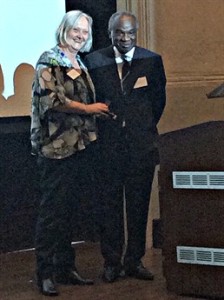
“Neglected Tropical Diseases”, a term now so commonly used, was first coined at the WHO Berlin meeting in 2005. On this 10th anniversary, the Liverpool School of Tropical Medicine launched its extended Neglected Tropical Diseases programme, at the University of Liverpool’s Victoria Gallery & Museum.
The LSTM’s Director Professor Janet Hemingway CBE opened the event, entitled “Addressing the Chronic pandemic of Neglected Tropical Diseases (NTD), the first decade and onwards”.
Looking back at the last decade of NTD partnerships, she stressed that an estimated one billion people from the world’s most disadvantaged and poorest communities are still affected by NTDs. The importance of looking back at history to underline lessons learnt was heavily emphasised throughout the meeting. As Daniel Buache from the APOC program concluded, “If you don’t know where you’ve come from, you don’t know where you’re going”.
Emeritus Professor David Molyneux of LSTM, summarised the advances made over the last decade and concluded by declaring that, of all the climatic, socio-political and logistical issues surrounding NTDs, the biggest challenge for us now is improving access to drugs in the field.
Fransesco Rio, WHO, emphasised that although the 2012 goals are somewhat ambitious, they help to focus efforts and direct funding. He argued that the real challenge in achieving these goals from here on was in capacity building on the ground.
These efforts can only continue with backing from funding bodies, including pharmaceutical companies and charities such as the Bill and Melinda Gates foundation. Celebrating their 15th anniversary, Julie Jacobson, a senior program officer with the foundation, highlighted that in 2013 alone the Gates foundation paid out approx. $3.6 million for improving global health, sanitation, family planning and nutrition.
At the LSTM, pharmaceutical partnerships are critical to many of the NTD programs. Andy Wright, Vice President Global Health Programmes at GSK, presented a very touching video that beautifully highlighted the impact that some of their 5 billion donated treatments has had on NTDs.
Several speakers from the LSTM presented work that was going on at the LSTM, where 17 out of the 19 NTDs are investigated. Professor Russel Stothard and Dr Sally Theobald from the LSTM explained how the CouNTDown research consortium was launched late last year, to explore how NTD programmes can be integrated in broader health systems responses.

The key message of the meeting was that it is clear that multi-disciplinary partnerships are key to the success of these programs and that integration into health systems is the next big challenge in ensuring successful implementation.
Following the meeting, Dr Anarfi Asamoa-Baah, Deputy Director General of the World Health Organization (WHO) and alumnus of the LSTM, was awarded the prestigious Leverhulme medal by LSTM’s Director, Professor Janet Hemingway.
Dr Anarfi Asamoa-Baah gave an amusing, insightful and inspiring talk addressing “Public Health Challenges in the post-2015 era”.
Some of the challenges addressed were-
- The distribution of misinformation and distrust in public health officials, especially as facilitated by access to social media
- The inevitable shift from infectious diseases to non-communicable diseases as public health burdens
- The dire consequences and knock-on effects of the Ebola outbreak in terms of education, orphaned children, the collapse of health systems and the cessation of other health programs during the outbreak
- A changing poverty map and the importance of looking at “neglected communities” rather than a country-wide average.
- The effects of climate change beyond mosquito migration into Europe, its effects on food, water and air quality, and how all of those things have a knock on effect on health.
- Competition in the global market, its effects on the price of essential drugs, bed nets etc.
He concluded with valuable lessons learnt over the last decade. Firstly, echoing the NTD meeting beforehand, that multi-disciplinary partnerships are essential for successful health programs- particularly bringing together Public health workers and clinical staff. And finally, that infectious disease has no boundaries, demanding a move towards universal health coverage, because “unless every country is prepared, no country is prepared”.

Comments